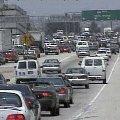Doctors warn patients with lung and heart disease to stay indoors during hot weather. Dr. Kausalya Pendyal tells her patients in Richmond, Virginia before they go outside to check the Air Quality Index - a U.S. government assessment of pollutants in the air.
"Avoid outdoor activities if you can, especially in the late afternoons and the evenings," she said. Medical science, bolstered by research from the U.S. Environmental Protection Agency, shows a strong link between air pollution and heart disease and stroke.
"Because cardiovascular death is the number one cause of death in the world, not just in developed countries, but throughout the world, the role that air pollutants play on this has a tremendous effect on overall world mortality," said Dr. Robert Brook, a specialist in cardiovascular medicine at the University of Michigan. Dr. Brook says just one to two hours of breathing automobile exhaust in traffic can be deadly.
"And that short, few-hour exposure is able to trigger a heart attack where they might not have had it for days or months, or never," he said. The long term effects of breathing polluted air are even more alarming.
"Over a few years of exposure, the increase for your risk of developing cardiovascular disease...heart attacks, strokes, heart failure…increases probably five to 10 times greater than it does over just a few hours of exposure," said Dr. Brook, who chaired group that produced a scientific statement on air pollution and cardiovascular disease for the American Heart Association. He also led a study that showed that airborne particles produced by automobile exhaust, industry and coal or oil fired power plants can cause blood pressure to rise to dangerous levels.
The study shows the risk is greater for the elderly, people with existing heart disease, and people, generally in poor neighborhoods, who live along major roads and highways.
The American Heart Association recommends reducing time spent in heavy traffic or jogging during rush hour, or near busy roadways and better treatment for cardiovascular risk factors.

